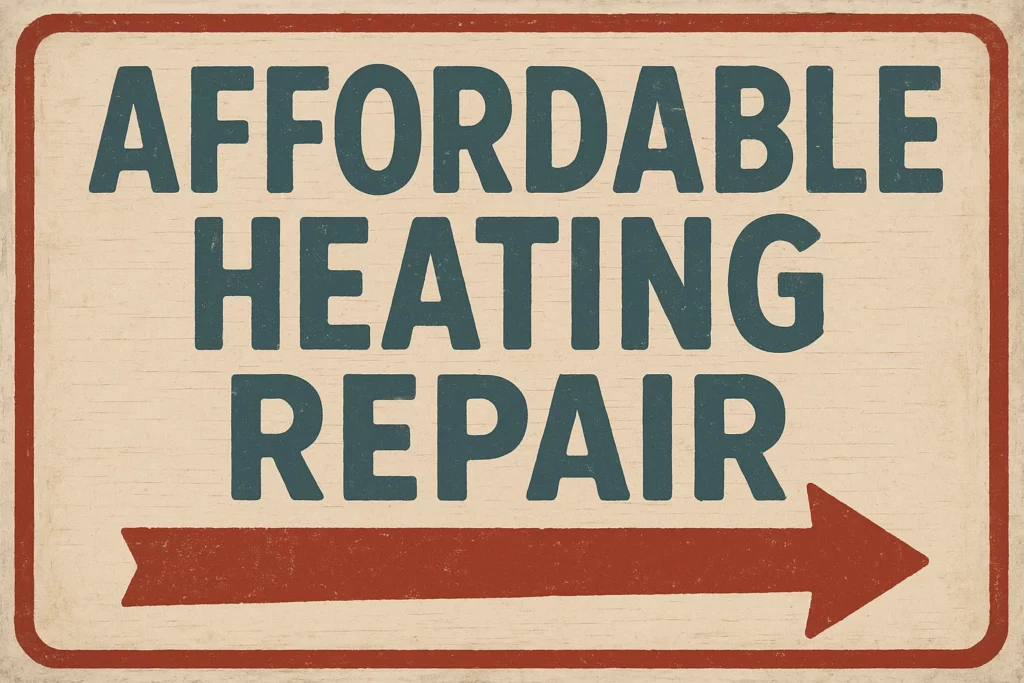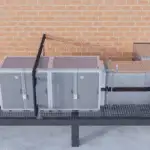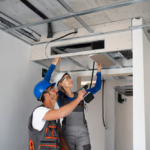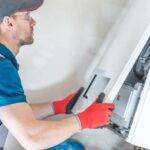As the temperature drops, a functional heating system is key for your comfort. A broken heating system can make you uncomfortable, raise your energy bills, and even be dangerous. That’s why finding reliable and affordable heating repair options is important.
You should be able to stay cool, breathe easy, and live in high comfort all year. With the best HVAC solutions, your home will be just right, no matter the weather. Our team offers cost-effective heating solutions for all your needs, from installing to fixing.
Key Takeaways
- Reliable heating repair options are key for a comfy home.
- Affordable heating repair services can cut down your energy bills.
- Top-tier HVAC solutions mean comfort and peace of mind.
- Cost-effective heating solutions fit all kinds of needs.
- Professional HVAC repair services can stop safety hazards.
Understanding Your Home Heating System
Knowing how your home heating system works is key to a cozy home. It keeps you warm and also impacts your energy costs. A well-maintained system means better comfort and savings. Read more: What is the cost of heating repair?
Common Types of Heating Systems in American Homes
Many heating systems are found in American homes. These include:
- Forced-air systems, which use ducts to distribute warm air
- Hydronic systems, which circulate hot water or steam through radiators
- Heat pumps, which transfer heat from one location to another
- Geothermal systems, which use the earth’s natural heat
How Your Heating System Works
Your heating system makes heat, usually from natural gas, electricity, or oil. It spreads this heat all over your home. A thermostat controls the temperature, keeping it just right.
Key Components That Commonly Need Repairs
Some parts often need fixing include:
- Thermostat: A broken thermostat can cause uneven temperatures
- Heating elements: Over time, burners, coils, or other parts can break
- Blower motor: A bad blower motor can make the system less efficient
By understanding your heating system, you can keep it running smoothly. Fixing problems quickly ensures your home stays warm and cozy all year.
Signs Your Heating System Needs Repair
Knowing when your heating system needs repair can save you from cold discomfort and high costs. Your heating system is complex and can have problems over time.
Warning Signs You Shouldn’t Ignore
Several signs show your heating system might need repair. Unusual noises like clanking or banging are often a sign of mechanical issues. If your system blows cold air or heats unevenly, it could be malfunctioning.
Other signs include higher energy bills without using more, a yellow flame on your gas furnace, and a musty smell. These could mean mold or incomplete combustion.
Emergency vs. Non-Emergency Heating Issues
Not all heating problems are urgent, but some are. A gas leak is a serious emergency that needs quick action. If you smell gas, turn off your system, open windows, and call a pro right away.
Issues like uneven heating or slightly higher bills might not be urgent but should be checked by a pro to avoid damage.
| Issue Type | Description | Urgency Level |
| Gas Leak | Smell of gas or suspected leak | High – Call Immediately |
| No Heat | System not producing heat | Medium – Schedule Repair |
| Unusual Noises | Clanking, banging, or whining sounds | Medium – Schedule Repair |
| Increased Energy Bills | Higher than usual energy costs | Low – Monitor and Schedule Maintenance |
When to Call a Professional Immediately
If you see a complete loss of heat, suspect a gas leak, or have a carbon monoxide detector go off, call a repair pro right away. These situations are dangerous and can cause health problems or even explosions.
Quick action can prevent accidents and keep your home safe and warm.
Where Can I Get Affordable Heating Repair?
You don’t have to freeze or overspend when your heating system fails. Affordable repair options are available. From installations to repairs, the goal is to keep your home comfortable all year round. To achieve this, finding a reliable and budget-friendly HVAC service provider is key.
Local HVAC Service Providers
Local HVAC service providers are often the best choice for heating repairs. They know the local climate and regulations well. They can respond quickly to emergencies and provide personalized service. When searching for local providers, look for companies with good reputations and experience with your heating system type.
National Heating Repair Chains
National heating repair chains can also be a good option. They offer a wide range of services and may have competitive pricing. But, make sure the national chain has local technicians who understand your area’s heating needs.
Finding Reputable Budget-Friendly Options
To find a reputable and budget-friendly HVAC service provider, start by reading reviews and checking credentials. This helps avoid companies with poor service records.
Reading Reviews and Checking Credentials
Online reviews offer valuable insights into a company’s reliability and service quality. Check Yelp, Google, and the Better Business Bureau for customer feedback. Also, verify that the company is properly licensed and insured.
Asking for Recommendations
Asking friends, family, or neighbors for recommendations is effective. They can share their personal experiences and help you make an informed decision.
A recent survey found that “75% of homeowners find online reviews to be a key factor in choosing a service provider.” This highlights the importance of researching before hiring a company for heating repairs.
“The key to a successful heating repair is not just fixing the immediate issue but ensuring that the entire system is functioning efficiently and safely.”
John Smith, HVAC Expert
When comparing different service providers, consider creating a table to summarize their key features:
| Service Provider | Rating | Price Range | Response Time |
| Local Heating Pros | 4.5/5 | $100-$500 | Same Day |
| National Heating Chain | 4.2/5 | $150-$600 | Next Day |
| Budget Heating Services | 4.8/5 | $80-$400 | Same Day |
By carefully evaluating your options and considering factors like price, response time, and customer reviews, you can find an affordable and reliable heating repair service that meets your needs.
Evaluating Heating Repair Service Reliability
To find a trustworthy heating repair service, consider a few key factors. A reliable service can save you time, money, and stress. Look for HVAC solutions that make you feel at ease.
Checking Certifications and Licensing
First, check if the service is certified and licensed. Look for NATE (North American Technician Excellence) or R-410A certifications. These show the technicians know modern HVAC systems. Licensing ensures the service meets state or local standards.
Assessing Experience and Specialization
Experience matters a lot. Choose a service with years of successful repairs. If they specialize in certain brands or systems, that’s a plus. It shows they really know their stuff.
“The right technician can make all the difference. We’ve seen too many cases where a poorly done repair led to more issues down the line.”
John Smith, HVAC Expert
Warranty and Guarantee Offerings
A good service backs their work with a solid warranty or guarantee. This protects you from bad work and gives you peace of mind.
Understanding Service Agreements
Service agreements vary a lot. Some offer maintenance plans with regular check-ups. Others might cover more, like parts and labor. Know what’s included to avoid surprises.
Post-Repair Support Options
Good support after the repair is key. A reliable service should help with any questions or issues. Look for a dedicated customer service line or online help.
| Criteria | Importance Level | What to Look For |
| Certifications and Licensing | High | NATE, R-410A certifications, State License |
| Experience and Specialization | High | Years in business, brand-specific expertise |
| Warranty and Guarantee | Medium | Comprehensive warranty covering parts and labor |
| Service Agreements | Medium | Maintenance plans, priority scheduling |
| Post-Repair Support | High | Dedicated customer service, online resources |
By looking at these factors, you can find a reliable heating repair service. They should meet your needs and provide excellent service.
DIY Heating Repair: What You Can Safely Fix Yourself
With the right knowledge, you can tackle simple heating issues without needing to call a technician immediately. As a homeowner, understanding the basics of DIY heating repair can save you time and money.
Simple Troubleshooting Steps
Start with basic troubleshooting before diving into complex repairs. Check your thermostat settings to ensure they’re set correctly. Make sure your circuit breaker or fuse hasn’t tripped or blown. Sometimes, a simple reset can resolve the issue.
If your heating system doesn’t work, check for any blockages in your vents or radiators.
- Check thermostat settings
- Inspect circuit breakers or fuses
- Look for blockages in vents or radiators
Basic Maintenance Tasks for Homeowners
Regular maintenance can prevent many common heating issues. Change your furnace filters regularly to improve efficiency and reduce strain on your system. You can also inspect your system’s exterior for signs of wear or damage.
- Change furnace filters every 1-3 months
- Inspect the exterior of your heating system for damage
- Keep the area around your heating system clear of clutter
When DIY Becomes Dangerous: Know Your Limits
While DIY repairs can be cost-effective, there are times when it’s safer to call a professional. If you’re unsure about the nature of the problem or feel uncomfortable performing a repair, it’s best to seek help.
Safety Precautions for DIY Repairs
When attempting DIY heating repairs, always turn off the power to your heating system at the circuit breaker or fuse box. Use proper safety gear, including gloves and safety glasses. Never work on a heating system while it’s hot or under pressure.
By following these guidelines and knowing your limits, you can safely perform DIY heating repairs and maintain a comfortable, safe home environment. Stay Cool. Breathe Easy. Live in High Comfort.
Remember, safety should always be your top priority when attempting any DIY repairs.
Comparing Heating Repair Service Costs
The cost of heating repair services can change a lot. As a homeowner, knowing these costs helps you plan your budget. It’s important for keeping your heating system in good shape.
Average Costs for Common Heating Repairs
Heating repairs can include fixing thermostats, replacing ignitors, and fixing leaks. These repairs can cost between $100 and $1,000 or more. The cost depends on the problem and the parts needed.
For example, fixing a thermostat might cost $100 to $200. But, replacing a heat exchanger can cost over $1,000. This is because it’s a complex and expensive part.
Factors That Affect Repair Pricing
Many things can change the cost of heating repairs. These include the type of heating system, the problem’s size, part costs, and technician labor rates.
Labor costs can differ a lot. This depends on the technician’s rates, the job’s complexity, and where you live. It’s key to think about these when looking at repair estimates.
Getting and Comparing Multiple Quotes
Getting quotes from different HVAC providers is a good idea. Look at the price, but also the provider’s reputation, warranty, and part quality. This helps you make a better choice.
Questions to Ask When Requesting Estimates
- What is the diagnosis of the problem, and what repairs are recommended?
- Can you provide a detailed breakdown of the costs, including parts and labor?
- What is the warranty on the repairs and any new parts installed?
- Are there any additional fees or charges not included in the initial estimate?
By asking these questions and comparing quotes, you can choose wisely. This ensures you get the best value for your heating repair needs.
Financing Options for Heating Repairs
You don’t have to spend a lot to fix your heating system. There are many financing options for homeowners. Heating repairs can be sudden and expensive. But, with the right help, you can fix your system without hurting your wallet.
Payment Plans and Financing Through Service Providers
Many HVAC companies offer payment plans or financing. These options help spread out the cost of repairs. This way, you can keep your home warm and cozy without financial stress.
Home Warranty Coverage for Heating Systems
If your home warranty covers your heating system, you might get some or all of the repair costs covered. It’s key to check your warranty policy. This will tell you what’s included and how to make a claim.
Government Assistance Programs for Energy-Efficient Repairs
Homeowners wanting energy-efficient upgrades can get government help. These programs offer financial incentives. They help pay for repairs or replacements that save energy.
Tax Credits and Rebates for Heating System Improvements
You might also get tax credits or rebates for energy-efficient upgrades. These incentives can lower the cost of your repairs or upgrades. They make a big difference.
By looking into these financing options, you can fix or replace your heating system without financial worry. Enjoy top-notch HVAC solutions that give you peace of mind.
Preventative Maintenance to Reduce Future Repair Costs
Preventative maintenance is key to saving money on repairs and keeping your heating system running well. By keeping up with maintenance, you can enjoy a cozy home without the surprise of expensive repairs.
Seasonal Maintenance Checklist
To keep your heating system in top shape, follow this seasonal maintenance checklist:
- Before winter: Inspect and clean or replace the air filter, check the thermostat, and ensure vents are not blocked.
- During winter: Monitor your system’s performance, keep an eye out for unusual noises, and maintain a consistent temperature.
- After winter: Schedule a professional tune-up, inspect the system’s electrical connections, and check for any signs of wear.
Benefits of Regular HVAC Tune-ups
Regular HVAC tune-ups have many benefits, like better efficiency, longer system life, and safety. A pro will clean and check your system, find problems, and adjust it for best performance.
Some key benefits of regular tune-ups include:
- Increased efficiency, leading to lower energy bills
- Reduced risk of sudden breakdowns
- Improved indoor air quality
Cost Comparison: Maintenance vs. Emergency Repairs
Preventative maintenance may cost upfront, but it saves money on emergency repairs later. Emergency repairs can be pricey, with extra fees for urgent service.
Consider the long-term savings:
- Regular maintenance: $100-$300 per visit
- Emergency repair: $300-$1,000 or more per visit
Creating a Maintenance Schedule
To get the most from preventative maintenance, make a schedule that fits your life. Set reminders for seasonal checks and tune-ups. By doing so, you’ll Stay Cool. Breathe Easy. Live in High Comfort.
By being proactive with maintenance, you’ll cut down on repair costs and keep your heating system reliable all year.
When to Repair vs. When to Replace Your Heating System
Deciding whether to repair or replace your heating system depends on several key factors. These include the system’s age, efficiency, and repair costs. Knowing these can help you choose wisely, balancing short-term costs with long-term savings and comfort.
Age and Efficiency Considerations
The age of your heating system is a big factor. Most systems last 15 to 20 years. If your system is close to or past this age, it might be cheaper to get a new, more efficient one.
Cost-Benefit Analysis of Repairs vs. Replacement
When thinking about repairs, compare the cost to the system’s age and condition. A cost-benefit analysis can guide you. Here are important points to think about:
- Cost of Repair: If fixing it costs more than half of a new system, it might be better to replace it.
- Frequency of Repairs: If your system breaks down often, it might be nearing the end of its life.
- Energy Efficiency: New systems use less energy, which can lower your bills.
Long-term Savings with New Energy-Efficient Systems
Getting a new, energy-efficient heating system can save you money in the long run. Modern systems use less energy but keep your home just as cozy. This cuts down on your energy bills and is better for the environment.
Signs Your System Is Beyond Repair
Some signs show your heating system needs to be replaced. These include:
- Repair costs keep going up.
- It breaks down a lot or keeps having the same problems.
- Your energy bills go up without using more energy.
- The system is almost or past its expected lifespan.
By looking at these points, you can decide if to repair or replace your heating system. This ensures your home stays cozy and energy-efficient.
Conclusion: Ensuring Year-Round Comfort with Proper Heating Maintenance
Keeping your heating system in good shape is key to comfort all year. Knowing your system, spotting repair needs, and picking trusted services helps keep your home warm. This is essential for the cold months.
Good heating care means regular checks, quick fixes, and knowing when to get a new system. Following this advice ensures you get the best HVAC solutions. Regular upkeep also saves you from expensive emergency repairs and makes your system last longer.
Investing in heating maintenance means a cozy home and lower energy bills. Enjoy a reliable, efficient heating system that meets your needs. Stay comfortable and worry-free all year.
FAQ
What are the common signs that my heating system needs repair?
Look out for unusual noises, inconsistent heating, and higher energy bills. A malfunctioning thermostat is another sign. If you see these, get a pro to check it out.
How often should I have my heating system maintained?
Get your system checked at least once a year, before the cold weather hits. Regular checks can stop breakdowns and keep your system running smoothly.
Can I perform DIY repairs on my heating system?
You can do simple tasks like changing filters and adjusting the thermostat. But, complex repairs are best left to the experts. DIY fixes can be risky and might damage your warranty.
What factors affect the cost of heating repair services?
The cost depends on the repair type, issue complexity, part prices, and labor rates. These all play a role in what you’ll pay.
Are there financing options available for heating repairs?
Yes, many HVAC services offer financing, payment plans, and warranties. You might also get government help or tax credits for energy-saving upgrades.
How do I choose a reliable heating repair service?
Look for certified, licensed, and experienced providers. Read online reviews, ask for referrals, and compare prices to find the best deal.
What are the benefits of replacing my old heating system with a new energy-efficient one?
A new system saves money on bills, works better, and makes your home more comfortable. You might even get rebates or tax breaks.
How can I prevent future heating repair costs?
Regular maintenance is the key. Make a maintenance schedule, get your system tuned up, and fix problems fast. This keeps your system running well.




